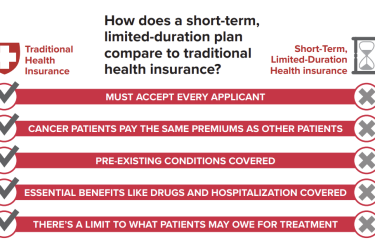States are going to have unprecedented opportunities to shape health care policy during the next couple years, as President Trump’s administration approves Medicaid waivers and loosens rules around the Affordable Care Act.
States are going to have tools and options they have never had before, said Joanne Kenen, executive health editor at Politico. Kenen moderated a panel on states and health care in the age of Trump on Friday at the Association of Health Care Journalists conference, Health Journalism 2018, in Phoenix.
Daniel Derksen, M.D., director of the Arizona Center for Rural Health at the University of Arizona, said he is looking to see which states in the coming year impose work requirements and lifetime limits on their Medicaid program.
Hemi Tewarson, director of the National Governors Association Center Best Practices Health Division, reminded the audience that we could see as many as 25 new governors next year, which will have a dramatic impact on how states tackle health care issues, particularly the opioid epidemic. Many governors are looking for ways to expand outpatient treatment.
Larry Levitt, senior vice president for special initiatives at Kaiser Family Foundation, said he is anxious to see how states stabilize their individual insurance markets now that Republicans have eliminated the individual mandate and the Trump administration has pushed association plans and short term insurance plans. New Jersey, for example, passed a bill Thursday creating an individual market.
The Affordable Care Act tried to create a more national standard for health insurance and the Trump administration is pushing it back toward the states, Levitt said, meaning there will be more variety than we’ve seen in at least a decade. Iowa and Tennessee, for example, plan to create insurance plans in all but name that will act in parallel to the individual market.
Grace-Marie Turner, president of the Galen Institute, said she wants to see if Congress takes a crack at giving the states any new flexibility through regulation.
All agreed that short-term health insurance plans, which do not have to offer the same benefits as Obamacare plans, could upend the market.
“I would not underestimate the significance of the short-term plans,” Levitt said. “The thing that has held them back is the individual mandate penalty.” With that gone, these plans may prove attractive to healthier people looking for a less expensive insurance. That could worsen the risk pool in the traditional individual market.
Tullen said these plans could act as a bridge for people switching jobs or opening a new business but it will be incumbent on consumers to be more engaged and have a better understanding of what they are purchasing.
Everyone is also watching Massachusetts’s attempt to close its Medicaid formulary, a move meant to control prescription drug costs. If the Trump administration approves that waiver, it would have a huge ripple effect across the country, Kenen said.








